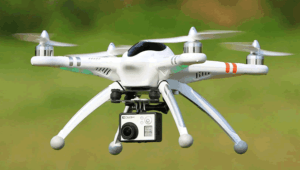Drones are relevant to critical healthcare – NHIA Director
 Dr Theophilus Owusu-Ansah, Eastern Regional Director of the National Health Insurance Authority (NHIA), has said avoidable deaths by pregnant women due to hermorrage were enough basis to justify the use of drones in delivering blood in emergencies.
Dr Theophilus Owusu-Ansah, Eastern Regional Director of the National Health Insurance Authority (NHIA), has said avoidable deaths by pregnant women due to hermorrage were enough basis to justify the use of drones in delivering blood in emergencies.
He said the argument that Ghana was not ready for drone’s delivery in the healthcare system was unfortunate and that whiles it is critical for government to invest in health infrastructure especially in the rural areas, it is equally good that in the meantime a fastest way of delivering essential commodities such as blood and medicines are explored.
Dr Owusu Ansah said the call for enough ambulances is a genuine concern and a step in the right direction “but that did not negate the fact that drones services are not important, considering the nature of our road networks we can’t compare the speed of a drone to an ambulance”.
The NHIA Director made the submission at the Eastern Regional Health Dialogue on the theme “Ensuring Sustainable and Equitable Access to Quality Health Services: Prospects and Challenges” organized by the Star Ghana Foundation in collaboration with the African Rights Initiative International and the Doctors in the Gap Project in Koforidua.
He said ambulances are critical components in ensuring sustainable and equitable access to quality healthcare services, but given the circumstances that our road networks are bad and ambulances have to travel long distances to save lives, the drones would play very critical roles as a stop gap whiles government builds the road infrastructure and networks.
Dr Owusu-Ansah cited for instance Afram Plains and many other island communities whose movement were determined by the availability of the pontoon and wondered the difference that an ambulance would make in times of emergencies as compared to the drone.
Dr Kwame Amin Boamah, Medical Director of the Eastern Regional Hospital, said due to poor road networks and scattered nature of our communities, accessibility to timely and quality healthcare was a challenge and therefore anything that would leverage on the speed for the time being is a good initiative.
He said many women died of hemorrhage due to lack of blood and some essential medicines and so if blood and some critical medicines could be delivered within “the calculated space then why not” adding that government must also map up strategies in addressing the human resource base in addition to all other interventions.
However some participants made up of members of the media, civil society organizations, the academia and experts in the healthcare were of the view that government should rather invest in getting every community or health facility an ambulance rather than the huge investment in the drone service.
Some of them argued that the drone service was a secondary matter and what the country needed now was putting in place a well-equipped health infrastructure in the rural communities to ensure equitable and timely access to health care services.
Source: GNA
